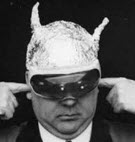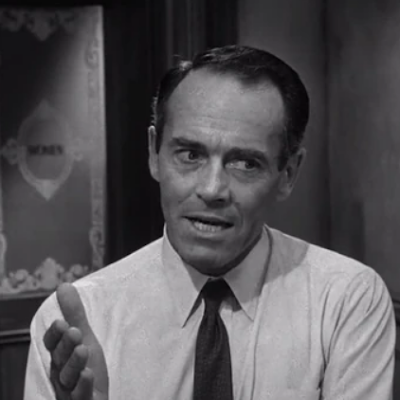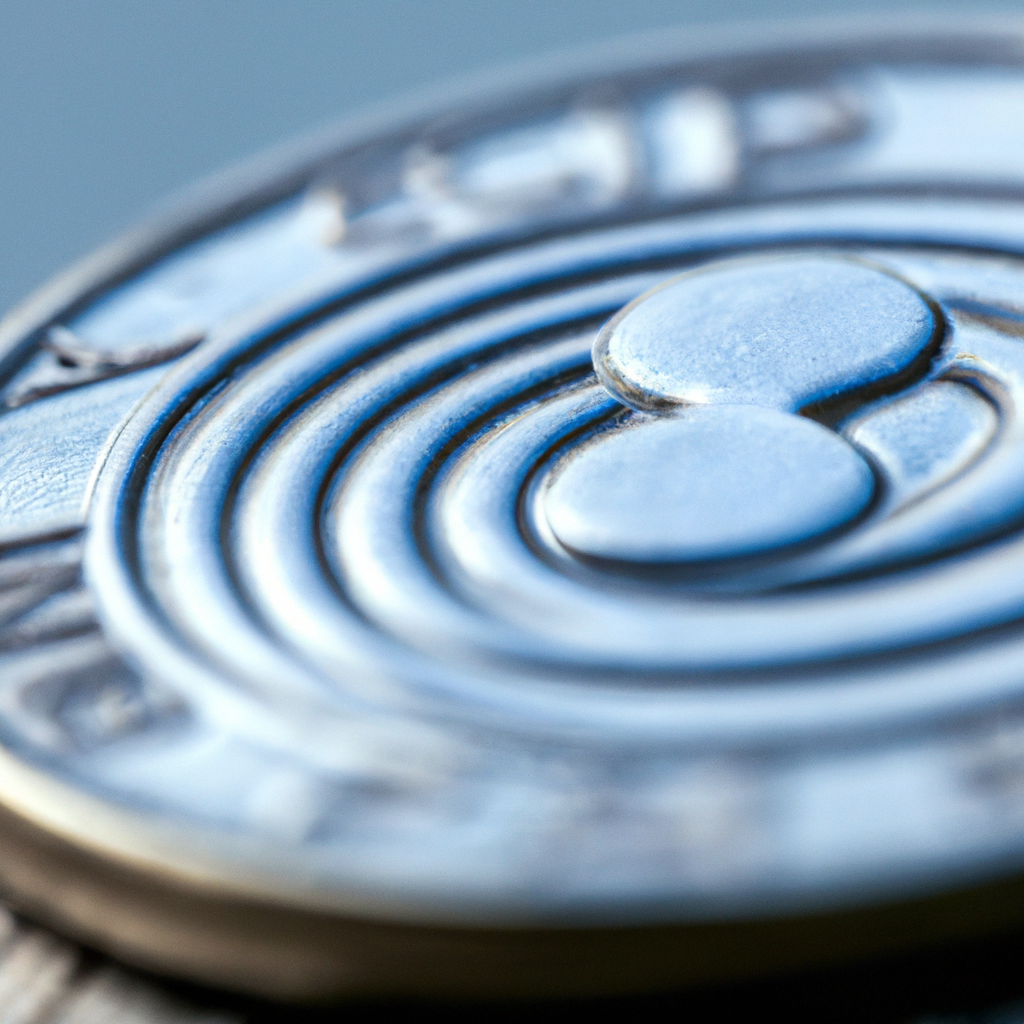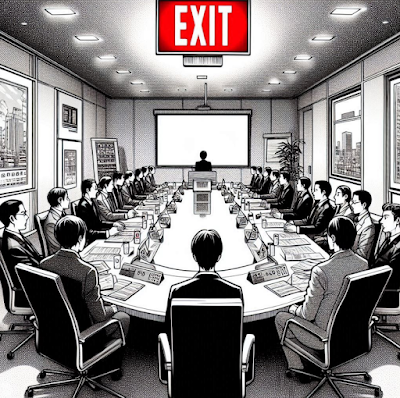There are times you try to connect the dots. There are others where those connections warrant adorning your trusted tin-foiled cap of choice; for you just can’t get there unless you do. This I believe is one of those times. And if correct? What at first might appear apocryphal, may in fact, be down right apocalyptic. And besides, what good is a tin-foil capped conspiracy theory anyhow if it doesn’t have the potential for doom, correct?
So, with that in mind, let’s venture down some roads full of conjecture where if it’s found to have more of a footing in fact as opposed to fiction?
Closer to a Minsky Moment
The implications for everything we now take for granted such as: money, enterprise, global commerce, and a whole lot more may be far closer to a “Minsky moment” than any of us dared to imagine.
Today, one can’t begin without scrutinizing the latest example of monetary flip-flop. e.g., The Bank of Japan’s (BOJ) surprise announcement of implementing negative interest rates.
Although “surprise” is the correct word, it is also an understatement. For it was only days prior current Governor Haruhiko Kuroda made statements to the contrary implying that he was not even thinking about adopting such a policy as of now. Then; he did precisely that. And the fallout is still being registered and assessed via the shock-waves continuing to resonate throughout the global markets, let alone, Japan’s own Nikkei™ and currency.
For those that watch the markets daily, you know what happened next. For those who don’t, I can best explain it this way: It had the exact opposite reaction that many (especially the so-called “smart crowd) believed would happen. I.e.,
More easing invokes a reflexive stocks up, and weakens the host currency simultaneously.
Instead: stocks fell rather dramatically, as their currency (the ¥en) spiked higher.
Again, the complete antithesis of what was thought “should” take place. And I’ll reiterate, the resulting aftershocks, in my opinion, are far from over.
If you look at this monetary flip-flop as an isolated event, it’s fair to assume there’s not too much more to see here than what we witness from any political flip-flop that happens on a daily basis across the globe. i.e., A President, Premier, or other elected official says X one day only to do Y the next. It’s far from anything new. However, that’s politics.
“Monetary policy” is quite another.
i.e., We are told it’s far more stable and less prone to the daily political swings inherent in elected politics. After all, isn’t that what “independent body” run by “appointed members” is supposed to represent in the first place? i.e., Less susceptible to the politics of the day.
With all that said, the more I toiled with the idea of the resulting calamity the BOJ now has to contend with following this obvious reputation of more intervention, along with, just what made them feel compelled to do it in the manner which they did. My mind kept coming back to a previous article I wrote on this topic a few weeks back. To wit:
“Did the BOJ’s out-of-the-blue reversal on its monetary stance which was refuted just weeks prior by Mr. Kuroda himself take place because after listening to the arguments, suggestions, as well as concerns, from the participants at Davos he concluded much like what the movie “Margin Call” depicted: It was all about to unravel? And if so: is this him deciding to be “first” and considered it his only choice?And if so, what does his actions pose for the credibility of his brethren bankers? Do they now act from a place of “Who can they trust?” And what does that mean for the rest of us? The implications are staggering when you begin to open those doors for they have the potential of making Pandora’s box seem harmless in comparison.”
In actuality it was more of the second line or paragraph that kept nagging on me. And, in particular, the “Who can they trust?” Why you may ask? Fair enough, but be forewarned we’re now venturing down what some might call “conspiracy alley.” So, in the spirit of safety: the proper helmet is now required.
Let’s remember when it was the BOJ Governor changed his mind (or had his mind made right?) It was right after returning from the annual meeting where all the other like-minded, dependent upon, and similarly employed brethren gathered: at Davos.
When Kuroda changed his mind
Why this is important to the speculation is this: Were his (meaning Kuroda) actions based on some self assessed need to “panic first” from distilled information he gathered, processed and concluded was his only option? Or, was it something far more nefarious, as in: the information he garnered was intentionally supplied, boogeyman’d and actually spurious? Expressed solely by a select few for the sole purpose to make him conclude his only choice was – to “panic first?”
If it were the latter? The implications are very far-reaching indeed.
It’s one thing to assess and make the wrong conclusions on your own. It’s quite another if your conclusions were made or based on deliberately signaled false pretenses.
Case in point: What if he was somehow either told, or was insinuated via some type of pretense of surety that some other bank (or China?) was going to do _________ (fill in the blank) leaving the BOJ far behind any curve they could overcome if they didn’t act first? Only then to realize after the move, what he was assured would happen by some other bank – did not happen. Leaving him along with the Japanese economy any currency in the monetary equivalent of – up the creek with no paddle.
Severe Chinese Yuan devaluation
Furthermore, as of this writing, if a Chinese Yuan severe devaluation was said to be imminent, today shows proof positive, that to be false. For it has yet to happen. And, so far; no signs to show to the contrary concluding the BOJ did in fact have time to signal the move first, rather than “stun” the markets.
Not only is all that within itself problematic. If true? (as in being goaded) It would also imply just how desperate, as well as frightened, central banks currently are. And, more importantly, the depths they’ll now go as to save whatever it is they believe is now unraveling.
The implications as I iterated would be dire if so. For, it would signal – they really don’t have anything left. Or worse: haven’t a clue as what to do next and are panicked by it. After all, one only needs to look at the latest market gyrations and market data points to realize the Fed. itself is coming to the conclusion (just listen to any Fed. speakers public testimony of late for confirmation) the rate hike of December was a policy error. Just how much of an error is what’s to be seen.
Back to Japan: Why or how could I come to such a conclusion you ask? Fair enough. Let me take you back just one year ago to another “shocking” and “stunning” monetary policy move that nearly mirrors this one: The un-pegging of the Swiss Franc.
SNB: Unpegging of CHF led Alderaan’s Where millions suddenly cried out in terror
It was January of 2015 just prior to the annual Davos gathering when the Swiss National Bank (SNB) decided to unpeg the Franc (CHF) from the €uro. The resulting consequences within the forex markets was akin to the destruction of Alderaan “Where millions suddenly cried out in terror.”
Some will deduce because it happened before, (only a week thereabouts) rather than during, that it sets the SNB decision apart from the same influences possibly inferred by the BOJ. After all, as thinking will go, they (the SNB) subsequently weren’t privy to the information at the meeting since this happened beforehand.
Au contraire I would argue. For if one understands exactly how, or what takes place before meetings such as these. (i.e., agenda setting, other speakers, or panelists insights and more.) One would know that there is a lot of “what’s to be said or announced, and by whom, prior to the actual meeting. I know this because, I myself, partake in similar types of conferences or venues where both speakers and panel members are involved having participated as both a featured speaker and panel member at the same event.
It’s done so everyone has some idea of what is entailed, and by whom, so you’re not completely blind going in as to what may, will, or be expected to be said or take place. There are also acquaintances and/or confidants you know and have discussions with prior, on your own volition, so as to have an even more informed concept going in. Any prudent speaker does it.
So with that in mind; remember what was being contemplated (or at least rumored) at that time? Hint: How much (or how effective) would the much-anticipated (as well as begged for) ECB’s QE initiative be? And more importantly: especially now that the Fed. had ended its QE program just months prior leaving the ECB effectively – on its own.
From an article I penned asking a very uncomfortable question, “Franc-ly Speaking: What If It Were All A Set Up?” To wit:
“So let’s move back into today with the SNB decision and the “set up” hypothesis. What would this move do that would reward the party responsible for the “set up”?It may very well solve an issue that scared the implementer far more than the SNB. And that issue just might be where the “Full Monty” monetary bazooka that was about to be revealed, was in fact, going to be witnessed for all to see – a pee-shooter. In other words, possibly far more restrained in nature by what the German (imposed) side of the argument would allow. And nothing brings the fear of losing one’s “omnipotence” more than needing to actually show it and there’s no there – there. Again.
Maybe the monetary threat of words this time were directed at the only place where words still might matter (for that’s all he has left) i.e., Directly at the Swiss as to make them cower into monetary panic.
The ECB would clearly know what would happen to the SNB if it were to release monetary mayhem with a its own version of QE with the Swiss Franc peg. Yet, how could one resolve the dilemma of efficacy if that so-called bazooka wasn’t as grand as its been suggested?
What if you could convince another monetary body (the SNB) into an outright panic; relieving your own condition? Regardless if the assistance it allows one (the ECB) for more time is temporary or not. For the key is – additional time. Any amount of time is better than none. For the implications of “no more time” are far too consequential for the ECB as a whole.”
Since that time it’s been well-recognized the initially implied round of “what ever it takes” was seen as highly inadequate when it became public as to back up the “bazooka” underpinnings jawboned incessantly by Mr. Draghi prior.
There were many subsequent articles from what is known as the “mainstream” financial press (e.g., WSJ™, FT™, and others) that the SNB probably did over react and could have endured the resulting fluctuations made manifest via the ECB at a far less cost than what resulted with their own highly charged flip-flop of their peg. For remember; just like the BOJ – the SNB had also just days prior refuted such a proposal. Then – they went ahead and did it just that. And from what I’ve been able to garner – that worked out just fine for the ECB. Not so much for the SNB. Are you starting to see the similarities (or pattern) here?
What if (again it is all conjecture) some, or possibly many, of the participants at Davos selectively dropped spurious hints or specious hypotheticals to the BOJ Govenor in order to scare the daylights out of him (China! China!! CHINA!!!) and have him react in a way he near assuredly would. Let’s not forget: the ¥en is a Wall Street trader’s darling.
Yes, the $Dollar is used as for carry trades while simultaneously the “flight to safety” choice currency. However, the ¥en is the currency of choice for “the carry trade.” Effect (favorably) the dynamics and carry costs associated within these trades, and poof! You single-handedly eviscerated many of negative effects associated with the incurred incremental cost of trades carried in a rising $Dollar. i.e., Partially negating, or cancelling out the cost effect of the 25 basis point increase via the Fed. rate hike. After all, who cares how or where anything is done as long as the effect is the same. Don’t let that point be lost on you. It really is a distinction with a difference.
Could the BOJ have been goaded to make such an about-face in policy by a meaningfully led concerted effort of participants who would both benefit politically (i.e., if it all went right it might give the Fed, ECB, and others some breathing time and/or room) and from others who would profit monetarily (i.e., all the Wall Street’ers) whose current portfolios are melting away almost as fast as an ice wall does around a reactor meltdown? I think you’re starting to understand if you’ve read this far. Intriguing, no?
And if you believe monetary policy isn’t the place for intrigue or things that make you go hmmmm bordering on some high-end Hollywood big screen release. May I remind you of anther “tin-foil” laden, made for gawking, spectacle that happened not that long before the whole SNB debacle? It too has three initials: DSK. Remember those? They represent the name of one Dominique Strauss-Kahn. Former head of the IMF (International Monetary Fund.)
Back in early 2011 then head of the International Monetary Fund (IMF) Dominique Strauss-Kahn (DSK) suddenly was charged with rape, sexual abuse, and unlawful imprisonment. DSK at the time was considered the rising star in the world of European monetary policy and politics. So much so that he was also considered a credible challenge to Nicolas Sarkozy for the French presidency. In a blink of an eye all that was wiped from the ledgers. And none seemed more surprised than DSK himself. In retrospect – all with good reason.
With little fanfare (for it doesn’t make as delectable a story for the main stream media as the original accusation) DSK was cleared. The case against him? Dropped. His name, career, political aspirations? Gone. As we now know he was replaced with a far more “banker” friendly head Christine Lagarde. Conspiracy? Who knows. However, if you read the article I referred to earlier you’ll see one thing seemed obvious – he was sticking his nose around places one might infer others did not like. And some still think banking is so much safer and cleaner than the loading docks of any major port. Sure they are.
As troubling as it may be that the above actually transpired paving the way for “tin-foiled” inspired scenarios to even be contemplated. What may be worse is the fact what the BOJ did, no matter how they came to the conclusion: had exactly the opposite effect than what anyone (especially I’ll wager central bankers themselves) reasonably expected would happen. And with it – has now caused an absolute quagmire of evermore serious increasing problems.
We’ve only seen what many would compare to “a storm surge.” The full brunt of the storm is yet to make landfall. And when it does, it may intensify as it comes ashore rather than dissipate. And we won’t know just how intense it may be till it actually bares down and shows its teeth. Which is one of the more frightful ways to experience any storm in my opinion.
Then again, this all might be a fanciful thought experiment laced with a bit of conspiracy and/or controversy to make it interesting as food for thought over the weekend. And if that’s so, then we can get to the news of the day that is more straight forward, to the point, and matter of fact where conspiracy theories could never take hold. Such as the death of Supreme Court Justice Antonin Scalia. After all, everything’s pretty straight forward there, right?
Full story here Are you the author? Previous post See more for Next postTags: Bank of Japan,Carry Trade,central banks,Davos,International Monetary Fund,Japan,Japanese yen,Meltdown,Monetary Policy,Nikkei,None,Swiss National Bank,yuan





































